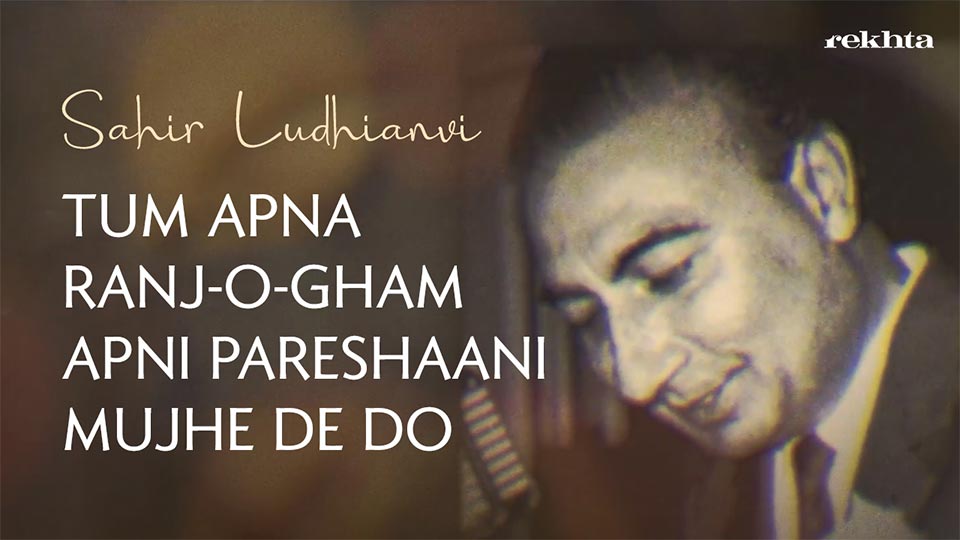Urdu Poetry Related to Independence Day
Today's top 5 Urdu Shayari
pattā pattā buuTā buuTā haal hamārā jaane hai
jaane na jaane gul hī na jaane baaġh to saarā jaane hai
only the flower's unaware, rest of the garden knows
my state,each leaf and every bud that in the garden grows
patta patta buTa buTa haal hamara jaane hai
jaane na jaane gul hi na jaane bagh to sara jaane hai
only the flower's unaware, rest of the garden knows
my state,each leaf and every bud that in the garden grows
Meer Taqi Meer
zarre zarre meñ mahak pyaar kī Daalī jaa.e
bū ta.assub kī har ik dil se nikālī jaa.e
zarre zarre mein mahak pyar ki Dali jae
bu tassub ki har ek dil se nikali jae
Danish Aligarhi
- See Ghazal
chalne kā hausla nahīñ ruknā muhāl kar diyā
ishq ke is safar ne to mujh ko niDhāl kar diyā
chalne ka hausla nahin rukna muhaal kar diya
ishq ke is safar ne to mujh ko niDhaal kar diya
Parveen Shakir
- See Ghazal
vo kyā manzil jahāñ se rāste aage nikal jaa.eñ
so ab phir ik safar kā silsila karnā paḌegā
wo kya manzil jahan se raste aage nikal jaen
so ab phir ek safar ka silsila karna paDega
Iftikhar Arif
bichhaḌne vāloñ meñ ham jis se āshnā kam the
na jaane dil ne use yaad kyuuñ ziyāda kiyā
bichhaDne walon mein hum jis se aashna kam the
na jaane dil ne use yaad kyun ziyaada kiya
Mohsin Zaidi
- See Ghazal
URDU POETRY COLLECTION
Compilation of top 20 hand-picked Urdu shayari on the most sought-after subjects and poets
WORD OF THE DAY
fardaa
- फ़र्दा
- فردا
ab vāda-e-fardā meñ kashish kuchh nahīñ baaqī
dohrā.ī huī baat guzartī hai girāñ aur
ab wada-e-farda mein kashish kuchh nahin baqi
dohrai hui baat guzarti hai giran aur
Quiz A collection of interesting questions related to Urdu poetry, prose and literary history. Play Rekhta Quiz and check your knowledge about Urdu!
To which of these poets era did Shefta belong to?
Start Today's Quiz



Rekhta App : World's largest collection of Urdu poetry
DID YOU KNOW ?

Maulana Abul Kalam Azad, freedom fighter and India's first Minister of Education, wrote his literary masterpiece Ghubar-e-Khatir during his captivity at Qila Ahmad Nagar during 1942-1945 and contains twenty-four letters that he wrote during that time. Maulana had gone to Bombay to preside over a meeting of the All India Congress Committee and was arrested there. All these letters were written in the name of Nawab Sadr Yaar Jang Maulana Habib-ur-Rehman Khan Sherwani Raees of Bhikampur District, Aligarh. But these letters, which are based on the events and observations of Qila Ahmednagar and on various topics, ideas and philosophies, could not be posted due to strict bounds of imprisonment.
The letters were private and were not written with the idea that they would be published. But after his release from prison, at the insistence of his secretary Maulana Ajmal Khan, Maulana published them in book form.
These letters are a treasure trove of scholarly and literary information as well as details of his early life and are considered the very peak of Maulana Azad's unique style of writing.
DID YOU KNOW ?
Ever wondered how the act of making counterfeit notes and the word 'Qalb', or heart, are related? Sounding much like medical lingo, counterfeiting notes is known as 'Qalb-Saazi', which is made from the Arabic 'Qalb' and the Persian 'Saazi', meaning, making, or creating. Although Qalb is commonly used for the heart, it also means to inverse, turn upside down, or transform completely. The term 'Qalb-Saazi' can be best understood with respect to these other meanings of the word Qalb.
Miyan Dad Khan 'Sayyaah' (1829/30 - 1907), a famous and playful Urdu poet with a thing for traveling, was tried under 'Muqaddama-e-Qalb-Saazi' for printing counterfeit currency notes and was sentenced to 14 years in prison. On the occasion of Queen Victoria's Silver Jubilee, he wrote and sent an ode in Her honor, as a result of which his sentence was shortened by several years.
DID YOU KNOW ?

Bahadur Shah Zafar, the last Mughal king, is very well known as a poet, too. His Ghazal, 'Baat Karni
Mujhe Mushkil Kabhi Aisi To Na Thii' is heard by all. What's far less known is that he did not only write
Ghazals, he also ventured in on other genres of Urdu poetry while also composing Doha, Geet, Thumri,
Holi and Bhajan. His Kulliyat also contains couplets in Braj and Punjabi. In his Punjabi poems, the
bringing together of Urdu and Persian couplets is also fine.
Also, in 1965, Dr. Aslam Pervez wrote a Ph.D. thesis on Bahadur Shah Zafar at Delhi University. He was
the very first person who spent months in the National Archives of India delving and extracting
insightful, authentic bits about Zafar, which eventually came out in the form of his book in Urdu titled
'Bahadur Shah Zafar' in 1986.
Before writing his famous book 'The Last Mughal', English writer William Dalrymple got this book of
Aslam Pervez translated into English and greatly benefitted from it.
DID YOU KNOW ?

When Sahir Ludhianvi was writing the lyrics for Ramesh Sehgal's film "Phir Subh Hogi", based on Russian novelist Dostoevsky's famous novel "Crime and Punishment", he stipulated that film's music would be scored only by a composer who has read Dostoevsky's novel. Although the film director wanted to take the duo of Shankar-Jai Kishan as composers, only Khayyam fulfilled Sahir's stipulation. What followed was Sahir penning some memorable lyrics that not only dovetailed beautifully with the film's story, but also reflected the poet's social concerns, perspectives, and humanism.
chin-o-arab hamara, hindostan hamara
rahane ko ghar nahi hai, sara jahan hamara
jitani bhi bildinge thi, setho ne bant li hai
futpath bambai ke hai ashiyan hamara
Sahir's empathy was not just limited to his poems, as a matter of fact, he never took seat of the man-pulled rickshaws of that time.
At the young age of 18, the fame that Sahir obtained as a poet was something that very few others ever got. At the time of his stepping into the film industry, his collection of poems 'Talkhiyan', had become acclaimed in the extreme. He always considered the lyrics of film songs pivotal to their popularity. Moreover, it was Sahir who demanded that the name of the composer be announced along with the name of the composer in the film songs aired on the radio program 'Vividh Bharati'; a demand which was well heeded to.
DID YOU KNOW ?

When a poet or author used to present their book to Ismat Chughtai, she would hold the book in her hands and sniff it for a little while. She has alluded to this habit of hers in an interview and many others, too, have witnessed it with their own eyes. She had supposedly also remarked that by smelling a book, she could literally take a whiff of it!
Ismat was also very fond of eating ice. In a child-like manner, she would take a lump of ice in her hand and munch on it clatteringly with her teeth. When writing a novel or short story, she would lie on her elbows, with a copy open on a pillow in front of her, a fountain pen in one hand and a lump of ice in the other. No matter how noisy her house was, it didn't bother her in the least when she was writing.
SHAYARI COLLECTION
Today's Special
bojh hastī kā utar jā.egā āḳhir ik din
vaqt chupke se guzar jā.egā āḳhir ik din
bojh hasti ka utar jaega aaKHir ek din
waqt chupke se guzar jaega aaKHir ek din
See Full Ghazal
RECOMMENDED POETS
Essential collection of Iconic poets – a list that goes beyond the realm of fame and populism
Rekhta blog
Featured Video
This video is playing from YouTube

E-Books Library
Kulliyat-e-Anwar Shaoor
Anwar Shuoor
2015 Kulliyat
Iqbal Dulhan
Bashiruddin Ahmad Dehlvi
1908 Moral and Ethical
Mughal Tahzeeb
Mahboob-Ullah Mujeeb
1965
Audhoot Ka Tarana
1958 Nazm
Shumara Number-002
Dr. Mohammad Hasan
1970 Asri Adab
Discover books & magazines in the world's largest online collection of Urdu literature
View More E-Books
Urdu Poetry Related to Independence Day
Source: https://www.rekhta.org/